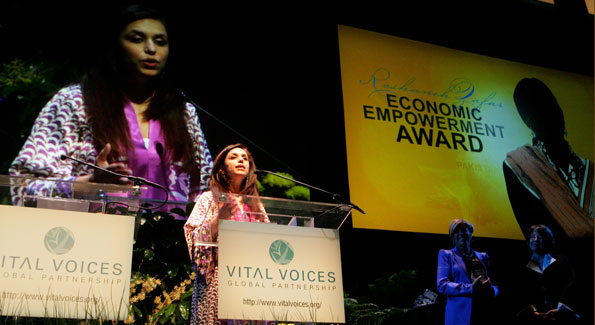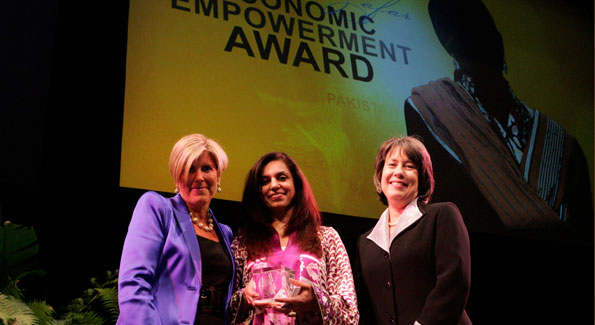2010 recipient of the Vital Voice Economic Empowerment award
By Sarah Khan
Roshaneh Zafar speaks at the 2010 Vital Voices Global Leadership Awards at the Kennedy Center (Photo by Sharon Farmer)
The 2010 Vital Voices Global Leadership Awards was held at the Kennedy Center on March 10. Over $1.3 million was raised at the event to support women causes around the world and honor women leaders contributing toward poverty alleviation, protection of human rights, ending violence against women, and promoting women education in local communities.
More than 1,000 guests attended this year’s awards titled Impact through Innovation: Women Inspiring Change. This included powerful presenters from the worlds of media, entertainment and government.
Roshaneh Zafar, the recipient of this year’s Vital Voices Economic Empowerment Award talked to the Washington Life magazine during her visit to Washington D.C. Zafar is the founder and managing director of Kashf Foundation, the first specialized micro finance institution (MFI) to serve women and their businesses in Pakistan.

Recipients of the 2010 Vital Voices Global Leadership Awards pose with Secretary of State Hillary Clinton and Senator Kay Bailey Hutchison during the ceremony at the Kennedy Center. (Photo by Joseph Allen)
WL: How and when did you start Kashf foundation in Pakistan?
RZ: Replicating the Grameen Bank model of micro finance, I started Kashf in 1996 with an aim to alleviate poverty in Pakistan. The organization deals with providing micro finance services to low income families, especially women, to increase their economic role and decision-making capacity which positively affect Pakistani society on the whole. Initially, we researched on finding and understanding factors that can have an impact on the demand for micro finance services by poor women.
WL: Did you have experience in micro finance before starting Kashf?
RZ: I worked for several years with the World Bank in Islamabad before starting Kashf. I am a graduate of the Wharton Business School at the University of Pennsylvania with a degree in Finance and Economics, and I also hold a masters degree in International and Development Economics from Yale University.
WL: What was the inspiration behind setting-up of Kashf?
RZ: After a meeting with Grameen Bank founder Professor Muhammad Yunus in 1993, I came up with the idea of following in Yunus’ footsteps to start an MFI in Pakistan. We discovered the ‘missing middle’ of the micro finance market and focused on filling this gap in the country. Seeing the potential in empowering poor women so they can become economically self reliant and overcome poverty barriers has been my inspiration behind starting Kashf. The foundation has been able to provide financial services in a sustainable manner to poor women and promote their economic self-actualization by providing economic continuous opportunities.
WL: Since its operations began, how far has the organization come?
RZ: Being one of Pakistan’s fastest growing MFIs, the Kashf Foundation is the first of its kind to achieve financial self-sufficiency. This in itself tells how far we have come in our pursuit to achieve economic independence and poverty alleviation for Pakistani women – we are a practical demonstration of a business case for investing in women’s economic empowerment.
We started with 15 female clients in 1996.
Today, we have up to 300,000 clients and have distributed $225 million in loans to over one million households with a recovery rate of 99.9%. In 2007, the Kashf Foundation was ranked 34 out of the top 50 MFIs in the world by Forbes.
WL: What type of products do you offer?
RZ: The foundation provides general loans, emergency loans, home improvement loans, business loans and insurance to low income households. We are innovators in the field of micro finance and the first non-government MFI to provide insurance services. The foundation has introduced individual lending and is currently developing a systematic program to impart financial education to women and girls.

Roshaneh Zafar with guests at the 2010 Vital Voices Global Leadership Awards at the Kennedy Center. (Photo by Sharon Farmer)
WL: Being a non-profit organization, how does it support its operations?
RZ: We have established the Kashf Micro finance Bank to muster deposits from low-income households to provide avenues for women to enter and contribute in the financial mainstream of Pakistan. Through the bank, women can now open an account with $1 and save up to $3.5 per month in a more professional manner. Previously, these women saved up traditionally at homes, asking a relative to keep it for them or invested in livestock.
How does the foundation reach out to the women population?
RZ: With a staff of 1,400, we have 153 branches across Pakistan. Through our trust building initiatives, outreach programs, training and door-to-door visits in cities, villages and towns, we identify, educate and provide loans to poor households, especially women, so they can start up small businesses and become financially self-reliant. We also provide gender training, create awareness through talks, create jobs in local communities and carry out small business development programs.
WL: What are you future goals for the foundation?
RZ: Kashf aims to improve access and scale of micro finance services and demonstrate that women in Pakistan are credible and active economic agents by reaching out to 500, 000 active female clients by 2014.
WL: Pakistani women are generally perceived to be oppressed members of society. Do you agree?
RZ: I do not consider Pakistani women to be oppressed and I think it is a biased view. Look at me, I live in Pakistan not due to any pressure, but out of choice and I am an independent professional woman who enjoys her freedom. Yes I do agree that gender inequality is an issue and women are not given an equal share, but this is gradually changing. A lot of strides are being made toward women’s empowerment; a sexual harassment bill has been passed by the parliament, a woman has recently headed the State Bank of Pakistan, and we see more women in the Parliament, judiciary and at all tiers of Pakistani society. So, it would be wrong to say that Pakistani women are oppressed.
WL: Any thought on Washington D.C?
RZ: It’s a very ‘politically correct” city.
Interviewer Sarah Khan is currently a Fulbright scholar from Pakistan studying at University of Missouri.
